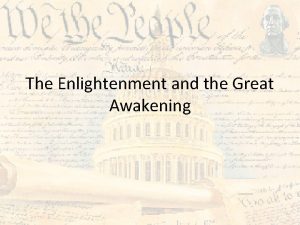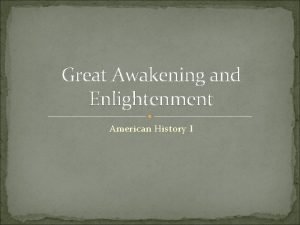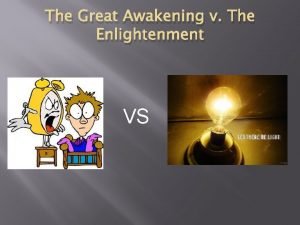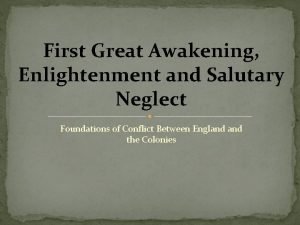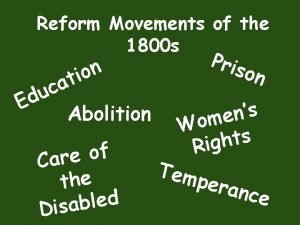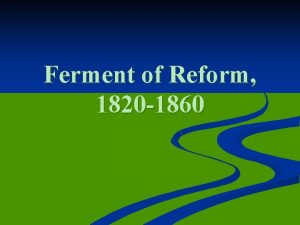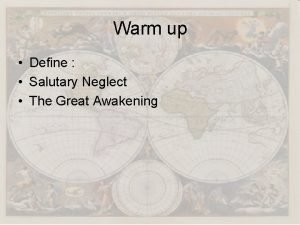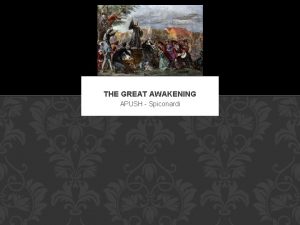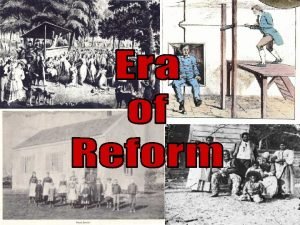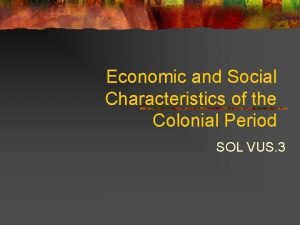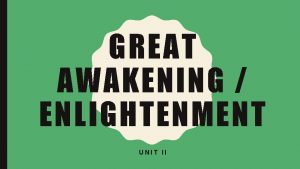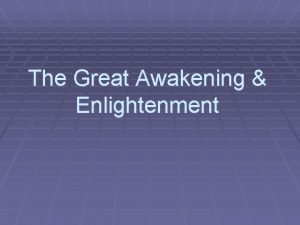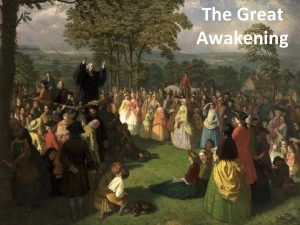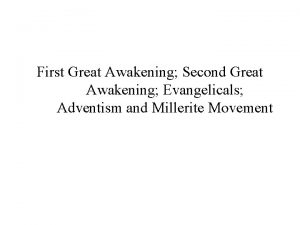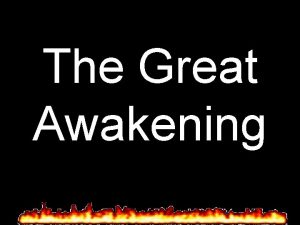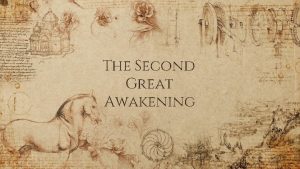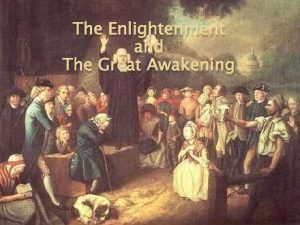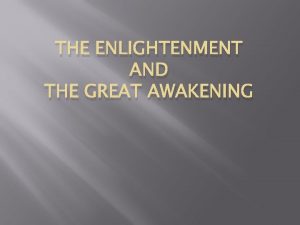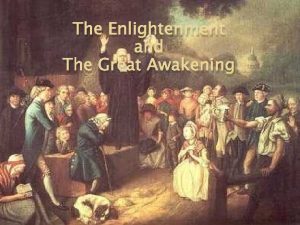The Enlightenment and Great Awakening The Enlightenment Late












- Slides: 12

The Enlightenment and Great Awakening

The Enlightenment Late 1600 s-1700 s: An intellectual movement known as the Enlightenment began in Europe. The Enlightenment emphasized reason, science, and observation and led to the discovery of natural laws Many Europeans began to believe that the light of human reason and science could be applied to society. Western Europe and the New World went from a God centered view of life to a man-centered view of life.

Enlightenment Arguments and Impact Enlightenment Arguments The use of science and reason could answer life’s mysteries Science and reason could also answer man’s questions concerning government and himself Many argued that they could find God on their own without the church/pastor and their “requirements’ from getting in the way. This questioning of the church leadership led to questioning of other leaders. Enlightenment’s Impact Deism Deists believed that after the natural laws were put in place, God stepped back and did not take part in the lives of individuals America’s FFs were Deists Deism leads to people refuting the “Divine Right of Rulers” idea John Locke – Social Contract Theory

Outcomes of Enlightenment People are born with natural rights Government has an obligation to protect those natural rights Kings have no right to govern people, people empower government

Enlightenment Leads to the Great Awakening 1730 s – 1740 s Shared experience for most colonists Revival of religion and an attempt to turn people back to God. For the most part it was a reaction to the Enlightenment. Key people included: Jonathan Edwards, George Whitefield, and the Wesley brothers

Causes of the Great Awakening People felt that religion was dry, dull and distant Fire & Brimstone style of worship; large, emotionally charged crowds Preachers felt that people needed to be concerned with inner emotions as opposed to outward religious behavior People in New England can read and interpret the Bible on their own Like the Enlightenment the movement stressed the importance of the individual

New Lights v. Old Lights New Lights Emotion and shrieking are signs of true faith, sincerity and conversion. Emphasis on feeling Salvation by faith alone. Not earned by good deeds. Old Lights Calm, serious and formal Emphasis on reason A virtuous life

George Whitefield Puritan Minster who used raw emotional sermons to reach all classes of colonists Preached that “good works” and “godly lives” would bring you salvation Forced to give sermons in open areas (revivals)

Johnathan Edwards Jonathan Edwards a Puritan Minster terrified listeners with his sermon “Sinners in the Hands of an Angry God”

Outcomes of the Great Awakening Birth of deep religious convictions in the colonies New churches built to accommodate new members Freedom from clergy People would “search” for churches they liked Colleges founded to train new ministers Ideals of equality and the right to challenge authority Birth of charitable organizations

America’s First Colleges 1636: Harvard – Puritans, to train clergy 1701: Yale – “to train men to preach the Gospel 1749: College of Phila – U. of Penn (revival hall) 1762: Queens – became Rutgers 1726: College of New Jersey – Princeton Moore’s Indian Charity Training College – to train Indians, moved to Dartmouth College of R. I. (Baptist) – Brown Kings College of N. Y. – Columbia, to train Indians All Ivy League Colleges (except Cornell) were to train men for the ministry

1795 Union College!!!
 Great awakening vs enlightenment
Great awakening vs enlightenment Great awakening and enlightenment
Great awakening and enlightenment Great awakening vs the enlightenment
Great awakening vs the enlightenment Enlightenment vs great awakening
Enlightenment vs great awakening Enlightenment
Enlightenment Second great awakening
Second great awakening American reform movements between 1820 and 1860
American reform movements between 1820 and 1860 Second great awakening apush chapter 15
Second great awakening apush chapter 15 Define salutary
Define salutary Great awakening apush
Great awakening apush Second great awakening definition
Second great awakening definition The great awakening laid the social foundations for the
The great awakening laid the social foundations for the Second great awakening
Second great awakening
